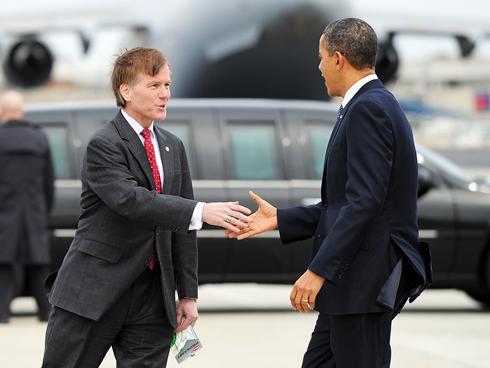The Commonwealth of Virginia may be moving closer to implementing a health insurance exchange as mandated by President Obama, raising questions about Republican Gov. Bob McDonnell’s stated intention to delay it.
Virginia is also inching toward Medicaid expansion, funded by federal tax dollars, though officials still say they will not expand the program unless forced to do so by the federal government.
When the Fourth Circuit Court of Appeals decided in September of 2011 that Virginia lacked standing to challenge President Obama’s health care law, McDonnell and the General Assembly began exploring options for implementing the health insurance exchange mandated under the law.
Although McDonnell announced no implementation would happen until after the Supreme Court rules on the constitutionality of Obama’s law, in May the state requested bids on the information system required by Obama’s exchange, which will necessitate a multimillion-dollar taxpayer funded project.
According to Mike Thompson, president of the Thomas Jefferson Institute, the state’s actions have been limited to steps required by the implementation process.
“The state is only getting prepared for implementation, in case the U.S. Supreme Court upholds the law,” said Thompson.
Implementation or Not?
However, John Graham, director of health care studies for the Pacific Research Institute, says what Virginia has done conflicts with McDonnell’s stated opposition to implementation.
“They are trying to get Obamacare locked into Virginia’s health care system before the Supreme Court or the voters decide whether it will stand,” Graham charged. “It’s a shame to see the governor of Virginia allow his health-care officials to backslide like this.”
Virginia Secretary of Health and Human Services Bill Hazel flatly denies the state’s policy has changed.
“We’ve done a lot of information technology upgrades that will improve our processes whether we proceed with an exchange or not,” said Hazel. “Our infrastructure, especially in our eligibility and enrollment system, has to be improved over the system we have in place today.”
The committee designated to study exchange implementation—on which Dr. Hazel sits—recommended that if Virginia has an exchange it should “be a market facilitator” in which any insurance carrier that could meet state guidelines could offer its products, Hazel says.
Considering Medicaid Expansion
Virginia decided to upgrade its Medicaid enrollment system with funding received under a series of taxpayer-funded grants to implement Obama’s law. Since the federal law dramatically expands Medicaid, adding as many as 25 million people to the program by 2020, the law provided seed money to states to undertake the expansion.
Although several other states have chosen not to participate until and unless the federal government legally forces them to, Virginia decided to take the money. Hazel says the McDonnell administration viewed the funding as a means of improving the efficiency of their Medicaid program, and possibly a future exchange.
“We’re still playing the preparedness game. We have many instances of improvements in the efficiency of the stuff we already do,” Hazel said. “For instance, one problem we have identified in Virginia is accuracy. One study reported up to a 16 percent error rate in our Medicaid applications process.”
If Obama’s law is stuck down or repealed, the state will still have a modernized Medicaid system thanks to the federal funds, Thompson argues.
“The system has found a lot of people not qualified for government money,” he said.
Wasting Taxpayer Funds
Although McDonnell is the head of the Republican Governors Association, Virginia is proceeding in much the same way as states governed by Democrats bent on implementing Obama’s law, Graham says.
“California’s Health Benefits Exchange recently contracted to pay almost $360 million to Accenture, an Irish consulting firm, to set up the information-technology for the new state bureaucracy,” said Graham.
Graham says this is an irresponsible choice.
“In a time of budgetary crisis, it is irresponsible for any state to spend taxpayers’ money implementing Obamacare, which is likely to be defeated by the Supreme Court this summer or the voters this November,” said Graham. “Does the governor think that these consulting firms will quietly go away once Obamacare is defeated? No—the state will be locked into an expensive contract.”





